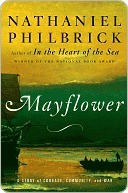More on this book
Community
Kindle Notes & Highlights
Read between
March 30 - April 27, 2024
Soon after, the Quakers, who began arriving in New England in 1655, were persecuted with a vehemence that climaxed with the hanging of four men and women on Boston Common between 1659 and 1661.
Led by several veterans of the Thirty Years’ War in Europe, the Puritans fell upon a Pequot fortress on the Mystic River. After setting the Indians’ wigwams ablaze, the soldiers proceeded to shoot and hack to pieces anyone who attempted to escape the inferno. By the end of the day, approximately four hundred Pequot men, women, and children were dead.
In the end, Miantonomi was unable to follow his own advice. Instead of attacking the English, he attacked Uncas and the Mohegans. Like Massasoit before him, Uncas had parlayed his allegiance to the English into a sudden and, from the Narragansetts’ perspective, most annoying increase in power and influence.
The conservatism of the English made it difficult for them to abandon their old and cumbersome matchlock muskets for the newer flintlocks. The Indians, on the other hand, knew from the start that they wanted only flintlocks.
From that day forward, Massasoit’s sons were known, at their own request, by Christian names. It was a new era.
By the 1660s, the English no longer felt that their survival depended on the support of the Indians; instead, many colonists, particularly the younger ones, saw the Indians as an impediment to their future prosperity. No longer mindful of the debt they owed the Pokanokets, without whom their parents would never have endured their first year in America, some of the Pilgrims’ children were less willing to treat Native leaders with the tolerance and respect their parents had once afforded Massasoit.
Alexander was outraged that Plymouth officials had chosen to treat him in such a condescending and peremptory manner. If there had been any truth to the rumor of a conspiracy would he be here, casually fishing at Monponsett Pond?
Philip’s “ambitious and haughty” demeanor at the Plymouth court that day moved one observer to refer to him mockingly as “King Philip”—a nickname he never claimed for himself but that followed the sachem into history.
But Philip’s idealistic resolve soon wavered. The following year, in April 1664, Philip agreed to sell a piece of land bordering the towns of Bridgewater, Taunton, and Rehoboth for a record £66 (roughly $12,000 today)—almost
Philip, it appears, had launched into a calculated strategy of selling land for weapons. That he was about to sell almost every parcel of land he owned was, in the end, irrelevant, since it was all to fund a war to win those lands back.
According to English law in the seventeenth century, two witnesses were required to convict someone of murder. But the English had only a single witness, and as came out in the trial, he had had prior dealings with one of the accused. Before supposedly witnessing the murder, he had been forced to give up his coat to Tobias to pay off a gambling debt.


